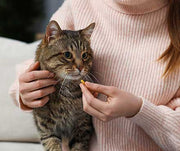Switching An Older Cat To A Senior Cat Food

If you’re like most cat owners, you want to do what’s best for your furry feline friend. And if your cat is getting up in years, that might mean switching to a food made specifically for senior cats. But is it really necessary?
Keep reading to learn more about senior cat food and why it might be a good idea to switch you cat over.
When Is My Cat Considered a Senior Cat?
The average life expectancy of a cat is approximately 12-15 years. A cat is considered a senior cat at around ten years of age. As a cat ages, it may start to experience some changes in its health and behavior. Just like humans, cats go through a process of aging. That can lead to some age-related health problems.
Senior cats are more susceptible to developing conditions such as arthritis, diabetes, cancer, and kidney disease. They may also experience changes in their appetite and metabolism. Senior cats may also become more lethargic and less interested in playing and interacting with people. It’s important to be aware of these changes so you can provide the best possible care for your feline family member.
One way to support your aging cat’s health is to switch to a senior cat food formula. One that is specifically designed to meet the nutritional needs of older cats.
But what are some of the benefits of senior cat food?
Benefits of Senior Cat Food
While there is no official designation determining the difference between regular “adult” cat food and “senior” cat food, formulas branded as “senior” cat food are intended to help your cat thrive throughout their golden years.
Lower in Calories for Slower Metabolisms
As cats age, they may start to slow down and become less active. As a result, their calorie needs may change, and they may need a different food formula than when they were younger. Senior cat food is often lower in calories than regular cat food to accommodate an older cat’s slower metabolism and reduced activity levels.
Ingredients that are Beneficial for Older Cats
Many senior cat food formulas contain ingredients that are beneficial for aging cats, such as:
- Omega-3 fatty acids support healthy joints in the face of conditions such as osteoarthritis.
- High antioxidant levels (including Vitamin E, Vitamin C, and Vitamin A) support healthy kidneys and urinary tracts.
- Softer textures and easier-to-digest ingredients for cats with missing teeth or digestion issues.
What Should You Look For in a Senior Cat Food?
While there’s no one-size-fits-all approach to graduating to a senior cat food diet, the best options tend to share the following qualities:
- Moderate to high-fat levels. In general, diets for senior cats should have moderate to high-fat levels. A cat’s ability to properly digest fat declines around the age of 11 or 12. Since fats contain more calories than other sources (such as proteins or carbohydrates), this decline can impact a cat’s ability to extract necessary energy from food.
- Protein. Research shows that older cats also experience a decline in their ability to digest protein. Especially after the age of 14. To compensate and help prevent the loss of fat and muscle mass, a senior cat’s diet should have enough protein for the cat to maintain muscle mass.
- Low Phosphorous Levels. Many senior cats are at risk of chronic kidney disease (CKD). While veterinarians previously recommended lower protein diets for older cats this is no longer the case. Senior cat diets should be lower in phosphorous, as CKD makes it more difficult for the kidneys to remove excess phosphorous from the bloodstream. Most senior cat foods out there have lower phosphorous levels.
- Palatability. A senior cat food formula can check every other box on the list, but if your cat refuses to eat it, it fails to serve its purpose. As cats grow older, their senses, including taste, begin to wane. Ideally, senior cat food should be appealing to your cat in both taste and smell.
Senior cat food is available at most pet stores. Because there are so many options available out there, it’s important to discuss your cat’s unique needs with your veterinarian before deciding on a senior cat food formula, in order to prevent nutrient excesses. By paying attention to your cat’s needs as they move from life stage to life stage, you’re doing your part in keeping your cat happy and healthy.
Previous article

Next article

Related posts
View all-

How to Train Your Dog in 2026: A Practical, Step-by-Step Guide
-

Keep Your Pets Safe During the Holidays
The holiday season brings joy, festivities, and a break from the usual routine. While you're enjoying the celebrations, it's important to remember that the holidays can present unique challenges for our furry family members. The new sights, sounds, and people can be overwhelming, and common festive items can pose unexpected risks.
Read Article -

Holiday Gifts for Every Pet Personality: The Ultimate Guide
The holiday season is finally here, and for many of us, that means finding the perfect presents for the ones we love most—our pets. Whether they are a steadfast dog who never leaves your side or an independent cat who graces you with their presence on their own terms, our pets are cherished members of the family. They deserve to celebrate right alongside us, stocking stuffers and all.
Read Article



